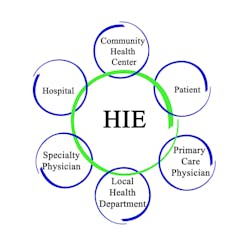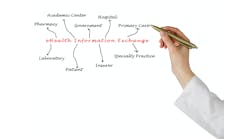Rochester RHIO in New York is the first health information exchange to deploy a new platform that allows HIEs to comply with patient-initiated requests for medical records. Ciitizen, a Palo Alto, Calif.-based consumer healthcare technology company, is launching the Cures Gateway, a platform that will enable HIEs to deliver data to a personal health app selected by the patient, consistent with the 21st Century Cures Act Information Blocking Rule. With this solution, the company said, HIEs simplify the process of fulfilling requests without the need to establish patient portals or to hire additional staff or require patients to show up in person to verify their identity.
Rochester RHIO provides HIE services to 1.5 million residents of Monroe, Allegany, Cayuga, Chemung, Genesee, Livingston, Ontario, Orleans, Schuyler, Seneca, Steuben, Wayne, Wyoming and Yates counties in Upstate New York. The HIE recently implemented the Cures Gateway to help ensure compliance with the Cures Act and to assist its participants in assuring seamless patient access to data. Also, Ciitizen has secured initial commitments from other HIEs including HealtheLink in Western New York and CRISP (Chesapeake Regional Information System for Patients) to implement the Gateway in the coming months.
“Ciitizen’s Cures Gateway removes the challenges associated with the information blocking rule by remotely identify proofing patients, matching patients to their data, and delivering that data securely to the patient,” said John Sheehan, CEO of Rochester RHIO, in a statement. Sheehan joined Rochester RHIO in July. He was most recently the principal lead consultant for All Tier Health Care Consulting in St. Petersburg, Fla. Prior, he served as president and chief executive officer of Toledo, Ohio-based Harbor, one of the largest behavioral health providers in the Midwest, and as chief executive officer for its Lighthouse Tele-health subsidiary.
The Cures Gateway is one component of the Ciitizen HIE Platform, which includes Prism, Ciitizen’s HIE-specific data warehouse and analytics reporting platform, and iQHD, the top-ranked data quality Consolidated Clinical Document Architecture (CCDA) inspector for HIEs. The Ciitizen platform performs identity proofing of patients through a comprehensive process of identity resolution, validation and verification aimed at achieving NIST Level 2 requirements. The Gateway will reduce or eliminate the burden on HIEs and their stakeholders by handling this identity proofing for them as well as the transformation and delivery of electronic medical records into a personal health record for the patient.
The Gateway includes several aspects that will ensure compliance with the information blocking rule, according to Ciitizen. Whether it is identity proofing standards; vetting of personal health application prior to connection; secure transport of records using either the HIE or FHIR standards to policies governing patient matching and data breach; secure transport of records to patients or their chosen apps; and transparency to the public regarding personal health app privacy policies, based on the multi-stakeholder vetted CARIN Code of Conduct, patients and HIEs can be assured that the information remains secure and vetted.
“Since the information blocking rules went into effect in April, we’ve seen HIEs struggle with compliance as they are unaccustomed to sharing data with patients. Ciitizen’s Cures Gateway is designed to eliminate the complexity so HIEs can simply make electronic data available without the need for portals or additional patient staff to handle patient inquiries,” said Deven McGraw, co-founder and chief regulatory officer at Ciitizen, in a statement. “Data privacy is critical in healthcare - and privacy includes providing patients with access to their information. When I was at OCR and ONC, we fought for this right as it is crucial to empower patients to better partner with their providers to find the best course of treatment for themselves and enable caregivers to be involved in their care. Our technology empowers individuals with their data and will advance personalized medicine initiatives moving forward.”


